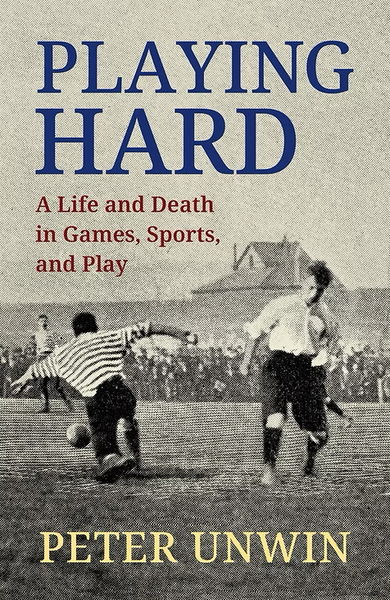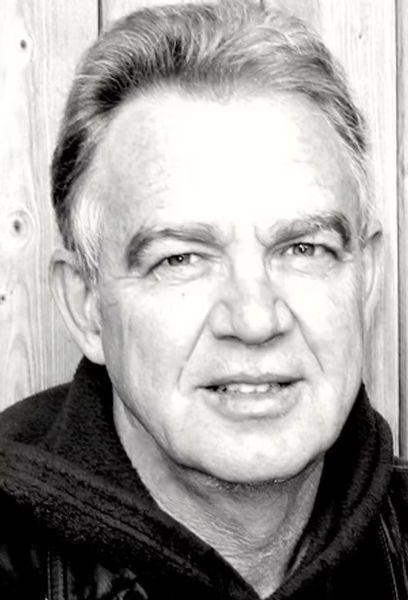Read An Excerpt From Playing Hard, the Moving Sports Memoir by Peter Unwin
Prolific author Peter Unwin has published ten books, as well as essays, short stories, and poems. His keen eye has been turned to nonfiction on a number of occasions, and today we're featuring his latest work, which celebrates the power of sport and games, and posits that to play hard is to live well.
In Playing Hard: A Life and Death in Games, Sports, and Play (Cormorant Books), the author delves into the myriad reasons that we play sports and games, and how these activities can define who we are as human beings. Unwin shows a clear passion for sporting and gaming endeavours throughout, and he links all of this to a fateful reconnection with his terminally ill father, who shared a love for play amidst a complicated and sometimes violent past.
We're featuring an excerpt from this exciting new nonfiction title right here on Open Book, for readers who love sport and play, and for those who are simply curious about how sports and games have taken on such a massive role in modern society and in everyday life.
An Excerpt From Playing Hard by Peter Unwin:
At some point, it dawned on me that my father was not only a man who loved soccer, who knew soccer, and who played soccer, he was also a man who had once been very good at it.
“Were you good?” I asked suddenly.
“Yes,” he said. “I was.” This was not bragging. It’s not clear to me that men such as my father from south Sheffield knew how to brag; maybe they were not quite sure how it was done. “I was nimble-footed,” he said. “Very quick-footed, very crafty.” Admitting this took him close to the horrible class crime of putting on airs. He was quick to deflate himself. “In England,” he began vaguely, “with the rain, the ball, back then, the ball, you see, was pigskin. In the grass, with the rain, it got heavy. I was quick-footed, but I was slight. For me, it was like kicking around a cannonball, you see.”
It seemed to me that I could see on his face the disappointment of trying to navigate a sodden soccer ball between the legs of heavier opponents. I watched him watch himself as he made a cross-field pass to a surging striker only to see the ball die short in the sopping grass, where an opponent scooped it up and turned around the attack. My father, in a quiet way, was rehearsing for me the reasons he had not become a professional footballer.
He also explained that immediately following the war, his ship, the HMS Dido, was tasked, as he put it, with showing the flag. “We were there to show the flag,” he said. “When the war was over.” And that is what they did. These gleaming ships staffed with ruddy, sports-loving lads sailed into various ports around the world, flags snapping, showing up in places like Marrakech, Halifax, the ports of India and Nor
way. They came to show the world that the war was over. Britain had won the war. They also came to play.
Your CanLit News
Subscribe to Open Book’s newsletter to get local book events, literary content, writing tips, and more in your inbox
It turns out that the entire crew of the HMS Dido had been selected for their ability to play football.
“You’re kidding,” I said.
“No, oh no. They did it all the time.” My father was adamant on this point.
Since then, I have entertained a vision of fleet admirals and senior naval officials, perhaps Winston Churchill himself, over cigars and brandy, sitting around with files in front of them, selecting the roster of the British Navy’s post-wa
r warships. “Al Unwin, radio operator, has nimble feet,” says one vice admiral, looking up from his dossier.
“A fondness for pints, though, and a hot temper.”
“But he does have nimble feet,” says another.
“Ideal for the desert,” says someone else. “Where it doesn’t rain and the ball never gets heavy.” So my father was assigned to the HMS Dido, and in the desert outside of Marrakech, he played a memorable game against the French Foreign Legion.
“Dad,” I said softly. “Do you remember the score?” He leaned back into his pillows and thought. He closed his eyes. From that semi-upright position, he soared back sixty-four years of his life.
“Two to one,” he said decisively.
“Did you win?” I said.
“Yes,” he said.
Then he added, uncomfortably, “But we cheated.”
________________________________
Peter Unwin is the author of ten books, as well as essays, short stories, and poems. He has been thrice shortlisted for the ReLit Award and his short story collection Life Without Death was shortlisted for the 2014 Trillium Book Award. His articles, essays, and poems have appeared in numerous journals and magazines. Peter recently completed a PhD in the Humanities at York University.






